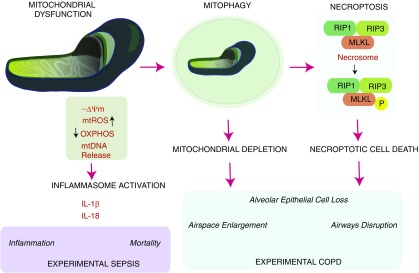Figure 3.
Significance of mitochondrial dysfunction in human disease pathogenesis. Mitochondria have been implicated in the pathogenesis of human disease. Mitochondrial dysfunction associated with depolarization of –ΔΨ, increased mitochondrial ROS (mtROS) production, decline in oxidative phosphorylation (OXPHOS) and energy charge, and increased release of mitochondrial DNA (mtDNA) has been linked to pathogenic processes. In human sepsis models, mitochondrial dysfunction associated with mtDNA release leads to activation of the inflammasome and secretion of proinflammatory cytokines (IL-1β, IL-18). These events may be associated with sepsis mortality and increased inflammation. In chronic obstructive pulmonary disease (COPD) models, mitochondrial dysfunction was associated with activation of the mitophagy program and subsequent activation of the necroptosis mode of cell death. Necroptosis is regulated by formation of the receptor-interacting serine/threonine-protein kinase (RIP)1/RIP3-containing necrosome, which activates (phosphorylates) mixed lineage kinase domain-like protein (MLKL). These phenomena were linked to increased airspace enlargement, airways dysfunction, and epithelial cell loss in COPD.

